ADEPT | Gagauzia 2016 | Presidential 2016 | Elections 2015 | Bashkan 2015 | Gagauzia 2012 | Political Parties
European integration — the last refuge of scoundrels?
Local elections in Moldova are traditionally perceived as politico-administrative elections. Voting for local and district councils is conducted based on the proportional electoral system with closed party lists. While at the level of villages and towns people can say they know the qualities of the candidates for local councils, at district level candidates can be known only by the residents of their localities, i.e. by about 5–10% of voters. Given that, we can say that voting for district councils is mainly political. In contrast, mayors are elected based on the majority system, and so the candidates’ personal qualities are more important than their political affiliation. Therefore, it is assumed that mayors’ elections are mainly administrative. There is no doubt that the administrative and political dimensions of the local elections influence each other, depending on the internal and regional context. It is the case of the recent local elections in Moldova, when the internal and regional political situation strongly influenced political voting at district level and administrative voting at least in the elections of mayors for Chisinau, Balti and Orhei.
Political voting in local elections
The local elections of June 14/28, 2015 took place in the atmosphere of a political, financial, economic and moral crisis. Legitimate expectations that a deep multidimensional crisis might have a major impact on the election results were not confirmed. On the contrary, the main political forces that governed Moldova in the past six years and generated endemic corruption, bringing the country to the brink of a financial and economic collapse, reconfirmed and even strengthened their positions. The main conclusion is that, despite quasi-total degradation of the socio-political and moral situation, those parties actually reconfirmed the legitimacy of their position in government.
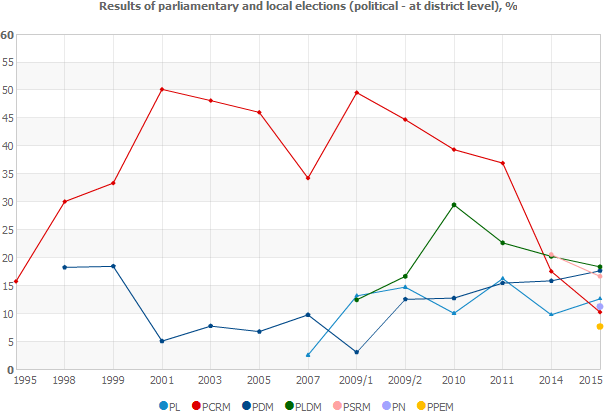
The factor mitigating the impact of the socio-political and financial crisis on the election results was traditional — division of the Moldovan society along ethno-linguistic criteria and, recently, geopolitical criteria. In a pejorative sense, we can say that Moldovan citizens preferred to vote for our corruptionists rather than for foreign or unknown people. In these conditions, the political vote obtained by governing parties in the elections of district and municipal councils in the past six years was 48.5%: the Liberal Democratic Party of Moldova (PLDM) — 18.3%; the Democratic Party of Moldova (PDM) — 17.6%; the Liberal Party (PL) — 12.6%. Considering that the European People’s Platform (PPEM) — the dissident emanation of the current government after the split of the PL in 2013 and of the PLDM in 2015 — obtained 7.6%, we can say that the allegedly pro-European parties obtained a political vote of 56%. In contrast, parties with openly or covertly pro-Eurasian messages obtained a total of 38%: the Party of Socialists of the Republic of Moldova (PSRM) — 16.6%; “Our Party” (PN) — 11.2%; the Party of Communists of the Republic of Moldova (PCRM) — 10.2%. Therefore, the electoral score in the geopolitical dimension is as follows: European vs. Eurasian integration is 56% to 38%. It might seem that the supporters of European integration have a reason for joy, but joy quickly turns to grief, when it becomes clear who the promoters of European integration are.
The political vote in the recent local elections confirmed the continuing segmentation of the political spectrum. While six years ago only four political parties — PCRM, PLDM, PDM and PL — had a representative rating, now there are already seven parties with a rating higher than the electoral threshold for parliamentary elections.
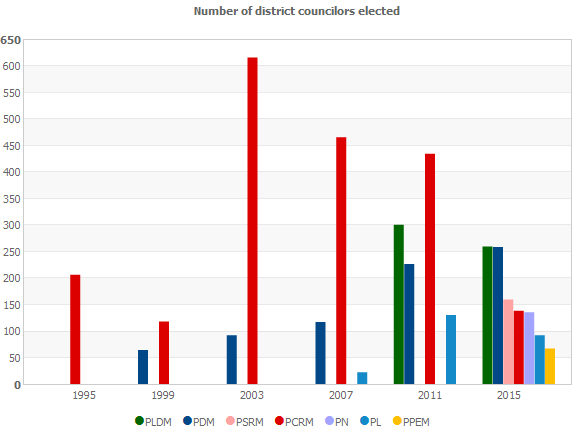
The PCRM being in the opposition for six years resulted in the gradual split of the party, whose electorate is currently represented by the PSRM and the PN. The split of the PCRM has several meanings. First, it might signal the end of the nostalgic period of the Moldovan political history. The PSRM attracted in the parliamentary elections of November 2014 about half of the PCRM’s electorate, harshly promoting the idea of reorienting Moldova’s integration towards Russia and the Eurasian Economic Union. The PN of Renato Usatii — a gentleman of fortune and a populist — won in the recent local elections the other half of the remaining PCRM electorate. As a result, the left political spectrum essentially split after a period of monolith that lasted about 15 years, and it means that the blocking potential of the political left was practically annihilated. Thus, out of eight parliamentary campaigns, four were early, and three of these four were caused by blockages that appeared in the elections of the head of state. The latest elections of the president were blocked for about three years due to the PCRM monopoly in the left segment. The development of the PCRM’s rating, especially after the parliamentary elections of 2014 and local elections of 2015, and the declarations of its leader suggest that the party is ready to cooperate with anyone and practically in any conditions, just so as to avoid early parliamentary elections. In these conditions, PL leader Mihai Ghimpu, who began negotiations with the governing parties to restore the parliamentary majority, has the chance to insist on becoming the candidate for the president of Moldova: the PDM obtained the position of head of parliament, the PLDM — the position of prime minister, so it is logical for the PL to get the position of head of state. The PCRM is anyway afraid of early elections and would vote for Ghimpu just to avoid them, especially as the voting for the president is secret. From the position of head of state, it would be easier for Ghimpu to demand the billion back.
The split in the right segment did not affect the PL, who managed to improve its rating. It affected, however, the PLDM, after former Prime Minister Iurie Leanca and his former deputy Eugen Carpov left the party and created the PPEM bloc, intending to create a party under the same name. It can be assumed that in the recent local elections, despite corruption scandals and the financial crisis, the governing parties reconfirmed their ratings because of the lack of feasible alternatives. The role of the PPEM is to show itself as such a potential alternative, either for the early parliamentary elections or for the ordinary elections in three years. The results of elections for the Chisinau Municipality Council, in the country’s capital with better educated and informed voters, prove that the PPEM could have won votes over from the PLDM and the PDM, whose leaders disappointed voters by being involved in corruption scandals and in the story of the theft of the century.
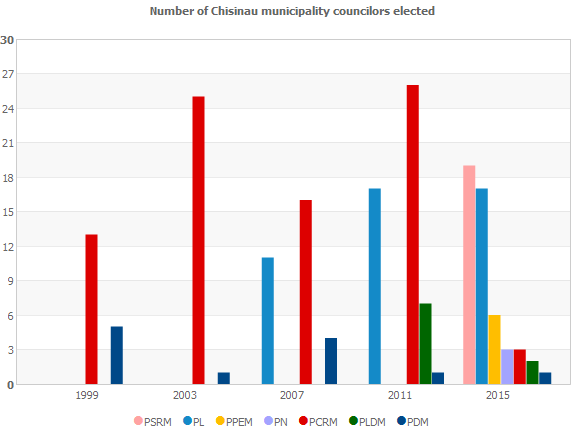
In these conditions, the PPEM leaders’ appeal to create a parliamentary majority with the compromised governing parties (PLDM, PDM) and the PL is more than strange. Especially since this majority can be created without the participation of MPs forming the PPEM, while the PL is openly stating its desire for alliance with those whom it accused, during the electoral campaign, of stealing the billion.
The huge discrepancy between the results of the political vote in the capital and in the underdeveloped regions of the country shows that the socio-economic weakness, poverty and moral degradation make up a favorable environment in which corrupt parties, by controlling unlimited administrative, media and financial resources, can sketch comfortable results, speculating with external, Russian danger and with promotion of European integration.
An interesting topic related to the local elections is the rate of participation in voting. It is believed that the fluctuation of the rate of participation influenced the final result in favor of the supporters of European or Eurasian integration because voters in the latter category were more disciplined and active. If we have a look at the relevant statistics, we can conclude that the rate of participation in elections has decreased.
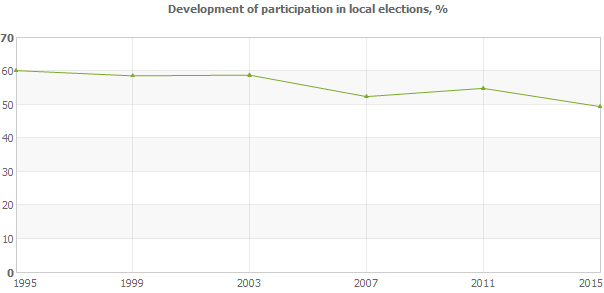
In fact, the decrease of the rate of participation is the result of changes in the registration of citizens with the right to vote. Thus, despite serious demographic problems in Moldova — decrease in birth rate, mass immigration of citizens, etc. — the number of officially registered voters is constantly growing, from ~2.3 million in 1995 to ~2.7 million in 2015. Hence the decrease in the rate of participation in the context of a relatively constant number of participants in local elections in the past 20 years — 1.4±0.1 million. So, generally, in the past 20 years the rate of participation in elections did not have a significant impact on the final results of local elections. Except in 1995, when the small rate of participation caused the invalidation of elections in Chisinau and the municipal administration was not elected, but appointed.
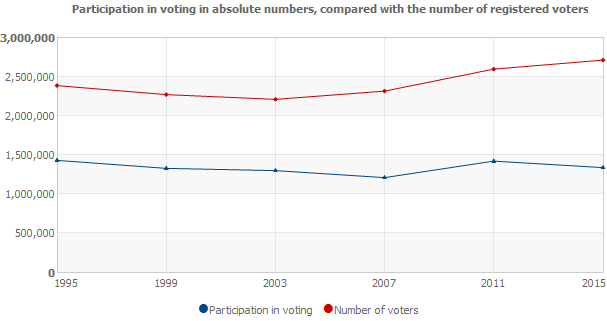
Administrative voting
Voting for mayors is crucial in local elections. According to surveys, the institutions of the local public administration have the highest rating of trust among public institutions, about 50%, while trust in the Parliament, Government and Presidency is about 10–15%. Trust in political parties as institutions is about 10%, while trust in the leaders of the currently governing parties varies between 10 and 15%. So, we may conclude that the mayors and persons with recognized authority in localities, many of whom were hunted by the governing parties, were real locomotives that pulled up the ratings of the compromised parties.
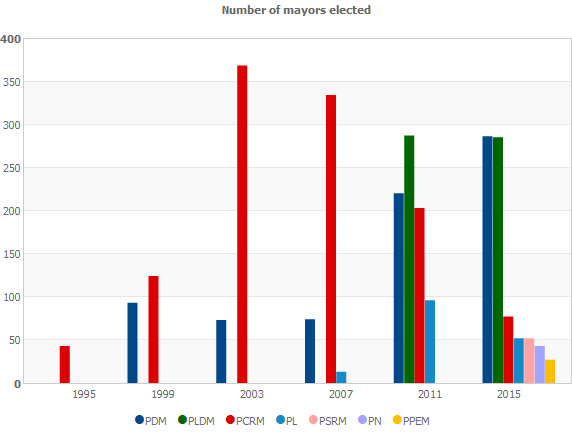
As there are exceptions from the rule in any field, there are clearly exceptions from the rules of administrative voting for mayor. In the local elections of 2015 such exceptions were the elected mayors of Balti (PN leader Renato Usatii) and of Orhei (Ilan Shor). Both winners are very young — 36 and 28 years old, accordingly. Both came from business and made themselves visible in those localities before being elected: the former by organizing grand concerts, the latter by supporting the local football team, which won the national championship. None of them has any experience in the administration of public affairs. The controversial reputation of the two did not matter for voters. Their main advantage was their resourcefulness, which matters a lot in a completely corrupt socio-political environment. We can say that Usatii and Shor are following the example of PLDM and PDM leaders, who came into politics from business, transforming politics into the most profitable business. The above can lead to the conclusion that the mayor elections in Balti and Orhei were not quite administrative, but rather a game of Russian roulette. The people’s socio-economic situation is still extremely poor, but maybe the gentlemen of fortune, Usatii and Shor, can turn Fortune towards Balti and Orhei.
It should be mentioned that Chisinau hasn’t benefitted from administrative voting for eight years. In this sense, Chisinau Mayor Dorin Chirtoaca in his third term is the counterpart of the newly elected mayors of Balti and Orhei. Clearly, there are some differences. Even the loyal supporters of Mayor Dorin Chirtoaca are saying that his victories are geopolitical. In fact, in the recent elections Dorin Chirtoaca did not even have an electoral program; instead, he constantly referred to the European course and Russian danger. Anyway, voters in Chisinau are the most educated and informed, and their vote reflects a choice in an extremely complex and difficult situation. The main result of elections in Chisinau is that the governing parties, involved in corruption scandals and in the theft of the century, were harshly sanctioned here.
Conclusions
Considering the extremely difficult socio-economic and political situation, the main conclusions of the local elections are as follows:
- The governing parties reconfirmed popular support for them at the very threshold of legitimacy, in the conditions of practically unlimited access to administrative, media and financial resources that other contestants didn’t have. This statement can be confirmed by the conclusions of reports on the monitoring of the electoral campaign and of international institutions’ reports on the situation of mass media and corruption in Moldova;
- The dramatic discrepancy between the result of political voting in the capital, Chisinau, where citizens are educated and relatively well-informed, and in the rest of the country, dominated by poverty, proves the efficiency of the use of manipulating financial, administrative and media factors controlled by the governing parties;
- Local elections took place in the context of exacerbation of the geopolitical factor through allusion to the danger of turning away from the vector of European integration towards the opposite vector — Eurasian. This factor had a major impact in the context of destabilization of regional security. Developments of the Ukrainian crisis suggest that the Russian spring of 2014 is gradually transforming into Russian winter, without time limits. In this situation, the decrease of enthusiasm among supporters of Eurasian integration is natural, especially that Ukraine, which has been resisting for over a year, stands between the Eurasian space and Moldova;
- The driving force of the local elections was represented by mayors and local leaders, who, according to surveys, enjoy the trust of about 40–50% of citizens, while the trust in parties is about 10%. Therefore, there was an image transfer from the local administration to parties, and not vice versa. In this sense, one can say that the apparent legitimacy of governing parties actually was not restored after the local elections;
- The PPEM had the role of participating in the local elections in order to become known as a pro-European alternative to the compromised governing parties. This task was successfully fulfilled until the point when the PPEM leaders announced their desire to participate in restoring a governing alliance with the current governing parties. It raises a natural question: If PPEM leaders intend to participate in the restoration of parliamentary majority alongside the current governing parties, which are compromised, what is the PPEM’s raison d’être? Especially that PL leader Mihai Ghimpu is in a hurry to become a shareholder of the AirBank company, created, according to him, in order to conduct the theft of the century.
Since the local elections took place in the context of a deep socio-economic and political crisis, their results should somehow suggest a way to come out of the crisis. One of the options is related to the restoration of the Alliance for European Integration (AEI-3), with the participation of PLDM, PDM and PL. But this option means nothing but the reproduction and perpetuation of the disaster caused by these three parties, with the same leaders, in the past six years. A leopard cannot change its spots! Not even if the eventual AEI-3 (or, why not AirBank) has in its reserves the shipwreck of the PCRM in order to ensure the parliamentary majority of 3/5 in the president’s elections in March 2016. The alternative would be to call early parliamentary elections in order to redress the situation in the country and free it from endemic corruption. According to the results of political voting in the recent local elections, the majority of Moldovan citizens prefer the vector of European integration, even in the version of its promotion by the compromised political parties, so they should especially support the European vector promoted by new, non-compromised, parties. Therefore, eventual early parliamentary elections shouldn’t cause the fear that the European vector might be replaced with the Eurasian vector.
The arguments of compromised parties and their supporters in favor of avoiding early elections are false, and their excessive concern for the European integration reminds us of false patriots, who always exploited the natural feelings of citizens. In this sense, we might paraphrase Samuel Johnson’s saying “Patriotism is the last refuge of a scoundrel” into a phrase appropriate for the current situation of Moldova — European integration is the last refuge of scoundrels. Obviously, it refers to the politicians that are exploiting citizens’ honest feelings.


